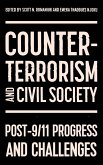This collection proposes a novel contribution to counterterrorism studies by challenging Eurocentrism and methodological nationalism in existing approaches. It explores how colonial epistemes shape everyday practices of counterterrorism. -- .
Hinweis: Dieser Artikel kann nur an eine deutsche Lieferadresse ausgeliefert werden.
Hinweis: Dieser Artikel kann nur an eine deutsche Lieferadresse ausgeliefert werden.









